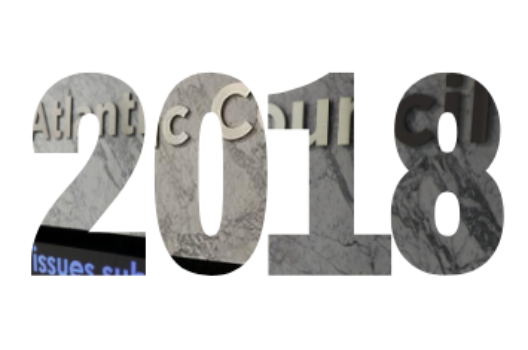As has been our practice, at the end of each year, the Atlantic Council staff and leadership select our colleagues’ work undertaken in the past year that has had the most impact. The result of this assessment is below, the “Atlantic Council Top Ten of 2018,” which captures ten of our many significant achievements. We produce this list both to galvanize ourselves around the results-oriented body of work we do during these historic times and to inform the most important individuals in our worldwide community about our most exciting projects.
The Top Ten are described below in no particular order, and the list comes nowhere near to capturing the breadth and wealth of activities the Council engaged in over the past year. It does underscore, however, the innovative nature of our work that has gained us so much positive attention and so many committed partners. We are proud of the team of intellectual entrepreneurs at the Council who are driven by the opportunity to achieve real and, whenever possible, measurable and lasting impact.
This year, we’ve also added a special section on our global flagship convenings to spotlight some of the work we do beyond Washington that both projects the Atlantic Council brand and mission and galvanizes our community of influence.
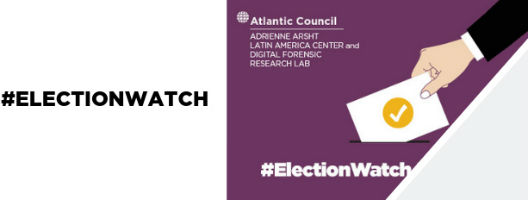
The Digital Forensic Research Lab’s partnership with Facebook on #ElectionWatch merits a spot on the top ten as a leading example of how the Council is deploying digital technologies to not only combat disinformation but also bolster our core set of capabilities. This work grew over the last year to eleven local and national elections on four different continents. An example of this broader initiative to provide independent and credible research about the role of social media in elections and the future of democracy, the Adrienne Arsht Latin America Center and Digital Forensic Research Lab partnered together to identify, expose, and explain disinformation in the lead-up to elections in Colombia, Mexico, and Brazil. This cross-programmatic effort, which will continue throughout 2019, aligns squarely with the Council’s mission of working together with allies to secure the future. In this case, we are helping to defend democracies, applying cutting-edge techniques and open source intelligence against a host of insidious threats that will plague the international system for years to come.
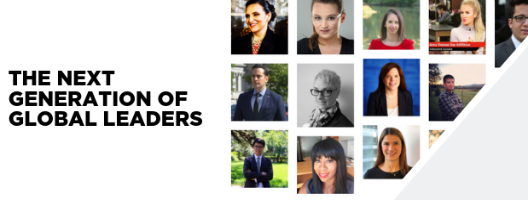
This year’s cohort of twenty-one Millennium Fellows, selected competitively from more than 650 applications from 100 countries, was perhaps our strongest yet, hailing from 12 countries and from fields ranging from psychology to diplomacy to international business to journalism—and including members of the Bolivian Senate and the Latvian Parliament. Peruse their incredibly impressive bios here.
This year’s class participated in a study tour focused on migration, tracing the route of refugees from the Syrian border through Gaziantep to the Turkish coast, and across the Aegean to Lesvos and then Athens. The fellows then joined the Council community in Brussels at NATO Engages alongside the NATO Summit. This trip, organized in partnership with the Council’s office in Turkey, led to a report on Turkey’s role in managing the migration challenge released during the UN General Assembly.
This year’s class of fellows was enhanced powerfully by a new approach we took, inviting CEOs of Atlantic Council-connected companies to nominate their very top under-35 performer for the fellowship. That achieved several outcomes: a richer diversity of talent, a deepening of relations between the Atlantic Council and its key partners in helping to “accelerate” next generation leadership development, and greater financial sustainability of the program and its alumni network.
This program also underscores our Atlantic Council-wide effort to prepare the next generation of international leaders for emerging challenges (and opportunities)!
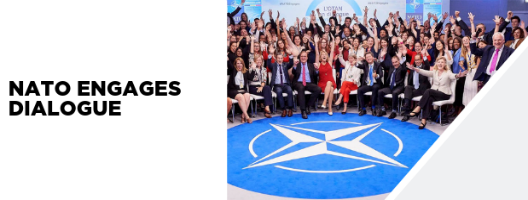
At a time of uncertainty surrounding NATO’s future, the Atlantic Council doubled down on its founding mission of supporting, analyzing, and promoting public understanding of history’s most effective and enduring alliance through our #StrongerWithAllies campaign. We mobilized our community at our flagship hosting of “NATO Engages: The Brussels Dialogue” – the official public diplomacy event of the 2018 NATO Summit, which took on a role of outsized importance.
Our stage became the public platform for leaders and members of Congress to issue their support for NATO, provide readouts from the closed-door summit meetings, and engage in candid discussions around the issues that challenge the future of the Alliance. The dialogue underscored two key Atlantic Council strengths—convening leaders at the highest levels around the most pressing challenges and working alongside other partners, in this case the Munich Security Conference, the German Marshall Fund, and Women in International Security—to magnify our potential for impact.
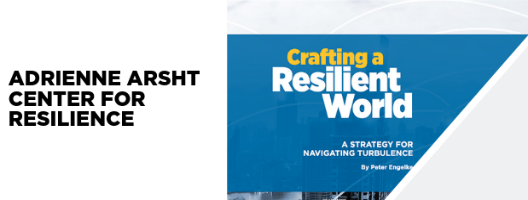
In its second year of operation, the Adrienne Arsht Center for Resilience tackled an issue that lies at the heart of the Atlantic Council’s mission and undercuts all of our work. Charged with preparing actors, including cities, government agencies, businesses, and global leaders to identify and address challenges before they become crises, the Center sharpened its mission in 2018 to address three focus areas: safety, security, and society. From launching a new podcast series to build resilience into our systems and societies, to hosting a public event with FEMA Deputy Administrator for Resilience Daniel Kaniewski, to developing a “Resilient-by-Design” framework, the Center expanded its reach beyond the Beltway to deepen its impact on an issue that—during a period of significant global change—will continue to disrupt and transform the ways in which societies operate and interact with one another.
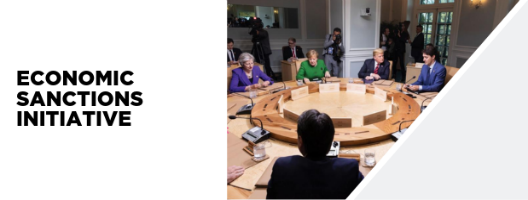
The Global Business and Economics Program’s work on economic sanctions gained momentum in 2018, placing the Atlantic Council at the forefront of the strategic debate on a topic of geopolitical importance. From issue-focused pieces on Iran, North Korea, and Venezuela, to an in-depth report on Russia’s Sanction Law, the initiative produced timely and informed analyses on sanctions, aimed at galvanizing the transatlantic private and public communities to stimulate thinking on economic sanctions and improve their design and implementation. With sanctions’ increased use as a US weapon of choice, interest will only increase in understanding both the opportunities and risks involved in their increased use – for companies, policymakers and strategists alike. This initiative demonstrates the power of cross-program collaboration at the Council, as the Global Business and Economics Program partnered with our Europe, Eurasia, Latin America, Middle East, and Asia teams to deliver interdisciplinary insights.
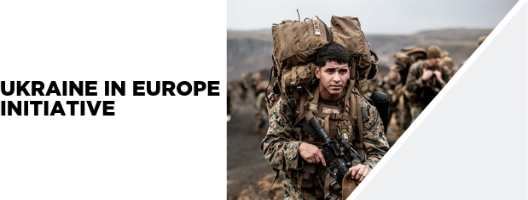
The Eurasia Center’s Ukraine in Europe Initiative excelled again as Washington’s go-to source on an issue that only gained in its significance in the past year. From the launch of the Ukraine Election Task Force aimed at monitoring, exposing and counteracting Kremlin interference in Ukraine’s 2019 election, to the organizing of a study tour to Ukraine for the Eurasia Center’s inaugural class of Congressional fellows, the initiative diversified its efforts in 2018 to achieve deeper impact to strengthen Ukraine’s security, preserve its territorial integrity, and advance transformational democratic, economic, and governance reforms. The Eurasia Center’s efforts are also a leading example of the Council’s efforts to enhance its congressional engagement—a key priority going into 2019.
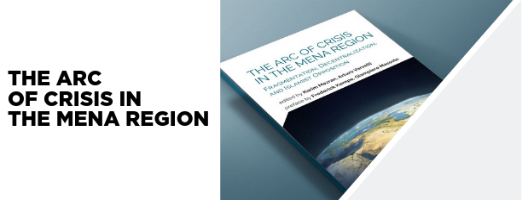
The Rafik Hariri Center for the Middle East leveraged its extensive regional expertise to analyze key trends that emerged in six MENA countries as byproducts of the “Arab Spring.” This body of work follows in the steps of the Council’s seminal Middle East Strategy Task Force, led by Madeleine Albright and Stephen Hadley, picking up on the Task Force’s findings and advancing proposals to address crises of governance in the region. A testament to the report’s global relevance and impact, the body of work was highlighted at the annual MED Dialogues in Rome—Europe’s biggest conference on Mediterranean affairs.
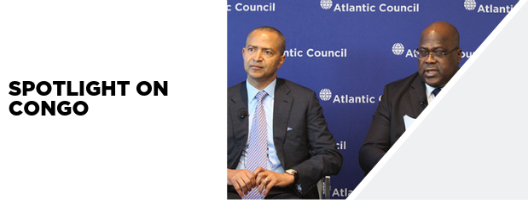
The Africa Center makes it to the Top Ten once again for its cutting-edge portfolio, which has set itself apart as Washington’s leading source for deep and unbiased analyses of the complex political and security challenges facing Africa. In 2018, the Center—led by the inimitable Peter Pham, who also serves as Secretary Pompeo’s Special Envoy for the Great Lakes Region of Africa—doubled down on its work on the Democratic Republic of the Congo.
The Center’s “Congo on the Edge” initiative not only published incisive analysis of the political, social, economic, and security challenges in this strategic Central African country, but it served as a catalyst for bringing key Congolese actors together with Washington policymakers, business leaders, and other stakeholders—and with each other. For example, two of the most important leaders of Congolese opposition figures, Moïse Katumbi Chapwe and Félix Tshisekedi, used the Atlantic Council platform to publicly share a stage for the first time, while a third opposition leader, Martin Fayulu, came by for discussions.
In another testament to the relevance of this body of work and to the importance of the Council’s convening power, the Africa Center also hosted senior Congolese governments officials like Ambassador Barnabe Kikaya bin Karubi, diplomatic advisor to President Joseph Kabila, and Corneille Nangaa, chairman of the National Independent Electoral Commission, and organized a roundtable for mining giant Gecamines Chairman Albert Yuma to engage with mining sector executives and investors on the new legislation governing the extractive industry.
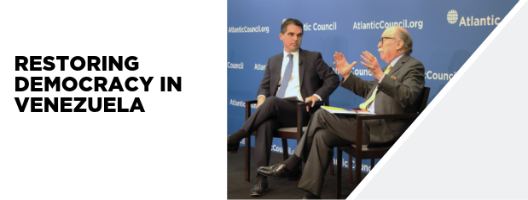
The Adrienne Arsht Latin America Center raised the bar once again for its swift action and multi-pronged approach to a priority issue of regional and global significance. The Center sprang into action to launch a major, high-level effort to advance discussions and planning around key technical issues the country is facing with the goal of improving the lives of the Venezuelan people and laying the building blocks for a return to democracy. The importance of the Center’s work on Venezuela was reaffirmed by four polls the Center conducted in 2018 that revealed new levels of the staggering humanitarian and economic crisis.
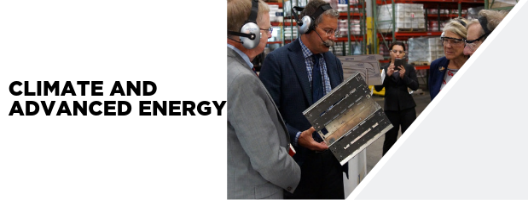
The Global Energy Center broke new ground in 2018 with its game-changing grant from the MacArthur Foundation that enabled the Council to elevate its reach and impact on climate change. The Climate and Advanced Energy Program set itself apart from other climate efforts by working inside and outside the beltway to galvanize US leadership on climate and advanced energy, bridging partisan divides by convening key stakeholders, and articulating the political, economic, and security components of the debate.
In its first year of operation, the program organized three delegation trips, to California, Ohio, and Puerto Rico—two of which featured the participation of our Executive Chairman Emeritus General Jim Jones—as well as a number of smaller trips to Indiana and Ohio. It also convened a variety of high level events, both public and private, in Washington, DC, including the North America launch of the annual REN21 Global Renewables Status Report, and has engaged a bipartisan group of US legislators and their staffs.
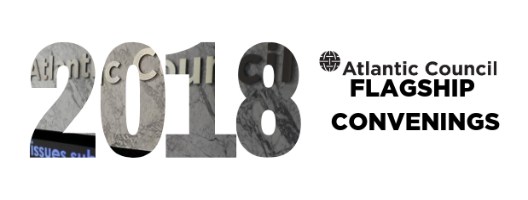
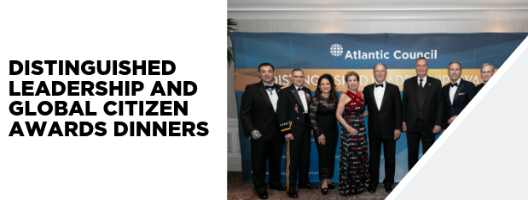
Our two awards’ dinners each year—one in Washington in the spring and the second in New York in September on the fringes of the United Nations General Assembly—have long been best-in-class. They are acknowledged by their supporters and attendees not only for saluting deserving individuals but doing so in a manner and before an audience that has garnered global attention. By honoring such selfless, principled and talented individuals, we endeavor not only to shine a spotlight on our mission and on them, but also to encourage others.
Last May, we bestowed our Distinguished Leadership Awards on President George W. Bush, the Grammy award winning artist Gloria Estefan, NATO’s Supreme Allied Commander General Curtis M. Scaparotti, and Howard Schultz, former Starbucks CEO and a leading philanthropist. More than 800 government, business, military, civil society and media leaders attended from some 50 countries.
In September in New York, we presented our Global Citizen Awards to President Mauricio Macri of Argentina, Prime Minister Erna Stolberg of Norway, and Chobani founder and philanthropist Hamdi Ulukaya. They were applauded by an audience of 500 individuals from some 30 countries. We were also proud there to salute the late Senator John McCain with a posthumous Global Citizen award. Cindy McCain accepted the award on his behalf with an acceptance speech that eloquently captured the values he fought for throughout his life.
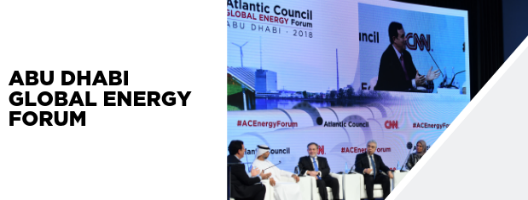
Our Global Energy Center kicked off 2018 with a home run: the second annual Atlantic Council Global Energy Forum in Abu Dhabi, organized in partnership with the UAE Ministry of Energy and Industry, helped set the global energy agenda for the coming year. The conference exceeded every measure of expectation—from the cutting-edge content, which generated significant media attention, to the high-level group of 400+ participants from 40 countries, which included 13 ministers, 37 industry leaders, and 4 ambassadors, to the record-breaking sponsorships and flawless execution.
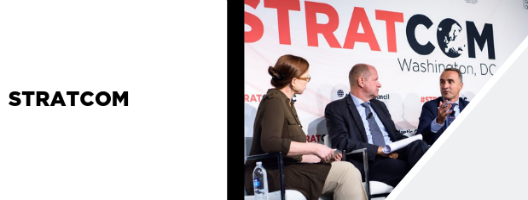
High among the year’s many achievements was the pro-democracy coup the Eurasia Center pulled off with their second annual StratCom conference.
The event brought together 250 attendees from some 24 countries, including government representatives from 15 countries to share best practices, coordinate research and engage with the policy community in order to address digital disinformation and strengthen global cooperation to counter it. International attendees were joined by US government representatives from the departments of Homeland Security, State, Treasury; from the Senate and the House; and from the Air Force. Senator Chris Murphy of Connecticut, Homeland Security Secretary Kirstjen Nielsen, and General Michael Hayden delivered the keynote addresses. The three-day event was capped by a government-only session at the Embassy of Lithuania where 15 governments sent representatives to discuss solutions, next steps, and further ways to collaborate – ideas on which our Eurasia team is already working through plans to implement.
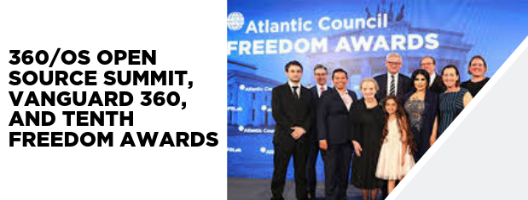
The Atlantic Council team deployed to Berlin, where we held a trifecta of interlocking events: the Digital Forensic Research Lab’s 360/OS open source summit, the Vanguard 360 delegation, and the tenth annual Freedom Awards.
In a powerful showcasing of our work to defend open-market democracies, the three events uniquely combined participation at the grassroots and civil-society levels with high-caliber representation from leaders across the government, media, and tech industries to advance a core component of the Council’s strategy and build strategic coherence around our global brand. The effort also marked a substantial step toward the Council’s 2021 goal to sharpen our innovative edge, by leveraging new methods and targeting new audiences, to tackle global challenges.
This innovative convening was complemented by the Vanguard 360, a high-level group of thought leaders and decision makers from the tech, media, and policy communities, led by Executive Vice Chair of the board Steve Hadley together with former US Secretary of State Secretary Madeleine Albright.
The events culminated in our tenth annual Freedom Awards, where we recognized an inter-generational, all-female slate of honorees: former Secretary of State Madeleine Albright, nine-year-old Syrian activist Bana Al-Abed, Afghan singer and philanthropist Aryana Sayeed, and the International Women’s Media Foundation. The Council’s Future Europe Initiative partnered with the Global Energy Center to demonstrate the Council’s focus on real-world impact by pushing the Three Seas Initiative from theory to action in 2018. Originating from a landmark Council 2014 study on Completing Europe, the Three Seas Initiative has grown into an intergovernmental process to integrate the nations between the Adriatic, Baltic, and Black Seas through cross-border transportation, energy, and telecoms infrastructure. Our engagement in the Initiative aims to enhance economic growth in the region to converge with the rest of the EU, boost US investment in the region, and bolster the region’s resilience to manage Russian and Chinese influence.
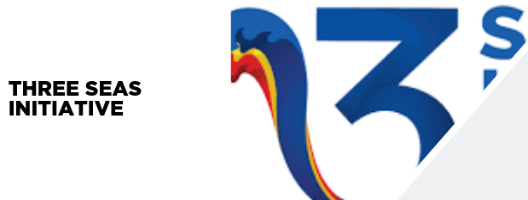
The Council has continued to serve as a thought leader, partnering with the President of Romania in 2018 to help convene and host the Three Seas Business Forum alongside the participating 12 heads of state, President of the European Commission Juncker and German Foreign Minister Maas in Bucharest. Atlantic Council Executive Chairman Emeritus General Jim Jones led the Council delegation to include members of our Ambassadorial Advisory Council who also visited Tbilisi and Kyiv as part of a Completing Europe study tour.
At the Forum, the Council released new reports on deepening regional energy integration and extending the effort to Ukraine and Moldova. The Future Europe Initiative extended this work by launching a focused effort with Google on the digital pillar of the Three Seas, with workshops in Poland and Romania, promoting regional investment with a major CEO Summit in Warsaw in October in partnership with Bank Pekao, and releasing a major study on US force posture in the region.
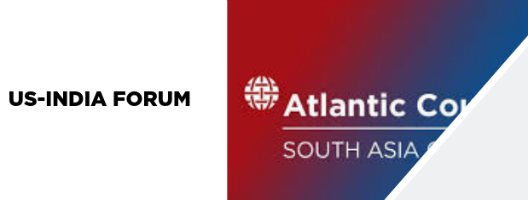
For the second consecutive year, along with the Aspen Ananta Center and the Indian Ministry of External Affairs, the South Asia Center convened the US-India Forum in New Delhi. This unique bilateral forum hosted by India and the United States aims to advance the dialogue between the two countries and promote a deeper, broader understanding of the countries’ decisions and policies. The Forum and the Center’s work aims to shape the US-India partnership, nurtured by its shared interests and values, into the defining partnership of the 21st century. This flagship effort of our South Asia team reinforces the Council’s mission of working together with friends and allies to secure the future.
Frederick Kempe is president and CEO of the Atlantic Council. Follow him on Twitter @FredKempe.
Image: A look back at the top events and achievements of 2018.
